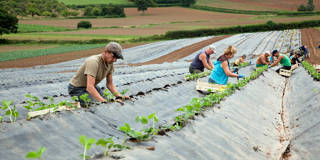Brexit no doubt carries many risks, but it may also carry a key opportunity: the possibility of building a more efficient, innovative, world-leading agricultural industry. Unfortunately, British policymakers are not on track to seize it.
OXFORD – The United Kingdom’s withdrawal from the European Union no doubt carries many risks. But, if British politicians and business leaders are right, it also creates an important opportunity: the possibility of building a safer, greener, more efficient, and more innovative farming sector. If the UK manages to seize this opportunity, the EU, the United States, and other economies with highly protected agricultural sectors might follow suit.
As it stands, large parts of UK agriculture are locked into the EU’s Common Agricultural Policy (CAP), which is accused of driving the sector toward larger, more industrial, and more environmentally damaging practices, including by failing to support farm diversity and directing payments to Britain’s wealthiest landowners. A 2005 investigation found that the £3 billion ($3.9 billion) in subsidies that the UK receives from the CAP went largely to major agribusiness and food-manufacturing companies, such as Nestlé, Cadbury, and Kraft.
Once freed from the flawed CAP, Brexit’s proponents argue, the UK will be able to build a more competitive agricultural sector that better serves farmers and agricultural workers, including by reducing dependence on distorting subsidies. And they could be right. In New Zealand, the abolition of subsidies in 1984 helped to catalyze innovation and diversification in the agricultural sector, which today drives New Zealand’s economic growth.

OXFORD – The United Kingdom’s withdrawal from the European Union no doubt carries many risks. But, if British politicians and business leaders are right, it also creates an important opportunity: the possibility of building a safer, greener, more efficient, and more innovative farming sector. If the UK manages to seize this opportunity, the EU, the United States, and other economies with highly protected agricultural sectors might follow suit.
As it stands, large parts of UK agriculture are locked into the EU’s Common Agricultural Policy (CAP), which is accused of driving the sector toward larger, more industrial, and more environmentally damaging practices, including by failing to support farm diversity and directing payments to Britain’s wealthiest landowners. A 2005 investigation found that the £3 billion ($3.9 billion) in subsidies that the UK receives from the CAP went largely to major agribusiness and food-manufacturing companies, such as Nestlé, Cadbury, and Kraft.
Once freed from the flawed CAP, Brexit’s proponents argue, the UK will be able to build a more competitive agricultural sector that better serves farmers and agricultural workers, including by reducing dependence on distorting subsidies. And they could be right. In New Zealand, the abolition of subsidies in 1984 helped to catalyze innovation and diversification in the agricultural sector, which today drives New Zealand’s economic growth.